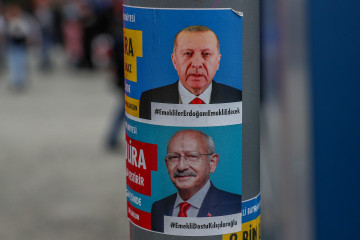

Uncertainty still looms over Turkey's political fate after more than 55 million of the country's citizens took to the polls on Sunday. Turnout in Turkish elections is usually high, with 87 percent of eligible voters casting ballots over the weekend.
After a tension-filled night, the presidential election is set to go to a run-off on 28 May, when Turkish citizens will be called to choose between the two main contestants, the incumbent president Recep Tayyip Erdogan and his People's Alliance, led by his own Justice and Development party (AKP), and his challenger Kemal Kilicdaroglu of the main opposition Republican People's Party (CHP), who leads a coalition of six parties that span the entire political spectrum, from social democracy to political Islam.
Known as the Nation Alliance, their common goal is to unseat Erdogan, who has ruled Turkey for twenty years. Kilicdaroglu also has the support of a smaller left-wing coalition.
"The opposition did not really benefit from the weakening of the AK party"
By early evening on Sunday, the streets of Turkey's largest city, Istanbul, were eerily quiet. Most Turkish citizens were glued to their TV screens, watching the country's most important election since its founding, as ballot boxes were counted across the country and results trickled in through the night.
The first results saw Erdogan in the lead. But by 8pm, opposition vice presidential candidates Ekrem Imamoglu and Mansur Yavas, the mayors of Istanbul and Ankara respectively, accused the state news agency Anadolu of broadcasting distorted results by counting votes for the ruling alliance first.
As more ballots were counted in areas where the opposition is traditionally strong, that margin narrowed, and the incumbent's votes fell below the 50 percent threshold needed to win the race in the first round.
With nearly all of the votes counted, Erdogan was in the lead by a larger margin than polls had expected, with 49.4 percent, with Kilicdaroglu at 45 percent and the third presidential candidate, Sinan Ogan, with just over 5 percent.
“The winner has undoubtedly been our country,” Erdogan told a cheering crowd at his party's headquarters in Ankara as final results were still coming in.
But analysts point out that Erdogan's own AK party obtained its worst result in years.
“They are back to their vote in 2002, when they first came to power,” Mustafa Aydin, a professor of international relations at Kadir Has University, told The New Arab.
|
|
“But the opposition did not really benefit from the weakening of the AK party,” he added. “The smallest parties who entered the alliance at the last moment attracted voters who don't want to vote AKP anymore.”
Kemal Kilicdaroglu, for his part, vowed to win the run-off race on 28 May and told supporters to be patient, pointing out that “the need for a change in society exceeds 50 percent”.
The opposition coalition has promised to restore Turkey to a parliamentary democracy, reversing the presidential system Erdogan introduced after a controversial 2017 referendum.
They also want to reverse Erdogan's unorthodox economic policies based on interest rate cuts - which most economists blame for the country's skyrocketing inflation and the Turkish currency's loss of more than 70 percent of its value in two years.
"The next two weeks are going to see the two largest coalitions bargaining with Ogan to court his voters"
Ultranationalist kingmaker
Ultranationalist Sinan Ogan, who took five percent of the vote, is now set to play the role of kingmaker.
“[Ogan's] voter base is mostly conservative and nationalist, and in that sense, closer to the governing coalition by inclination,” Aydin told The New Arab.
“Now, we don't know how much power Ogan has to influence his voters, because this is the first time he is a candidate and there is no strong party behind him,” he added.
Analysts agree that the next two weeks are going to see the two largest coalitions bargaining with Ogan to court his voters.
Ogan, who was expelled from the far-right National Movement Party (MHP), the second largest in the People's Alliance coalition, has been running on a virulently anti-refugee platform, promising to send all of Turkey's four million Syrian refugees back home immediately.
“What I want is clear: the departure of Syrians,” Ogan said in a speech after the vote, appealing to his base while refraining from supporting either of the candidates.
“In this, Kilicdaroglu has much more flexibility because he's already opposing the existence of Syrian refugees in Turkey and has some sort of ideas how to return them,” Aydin added.
Erdogan, on the other hand, is seen as having a softer and more ambivalent stance on this issue. After first welcoming millions, he now promises to Syrian refugees back “voluntarily”.
However, many already see their rights seriously curtailed under the current government - including restrictions on residency and free movement.
|
|
The other bargaining card for the two presidential candidates is offering cabinet or vice-presidential positions.
“The ruling party may have an advantage in doing that,” explains Berk Esen, a political science professor at Sabanci University.
“The Nation Alliance can't do that because they already have the IYI party [the second-largest coalition partner] and seven vice-presidential candidates. They're full,” Esen says.
“However, Kilicdaroglu can appeal directly to Ogan's voters. Clearly, he will need to shift a bit in the direction of Turkish nationalists,” he adds.
Ylenia Gostoli is a reporter currently based in Istanbul, Turkey. She has covered politics, social change, and conflict across the Middle East and Europe. Her work on refugees, migration and human trafficking has won awards and grants
Follow her on Twitter: @YleniaGostoli






 Follow the Middle East's top stories in English at The New Arab on Google News
Follow the Middle East's top stories in English at The New Arab on Google News


